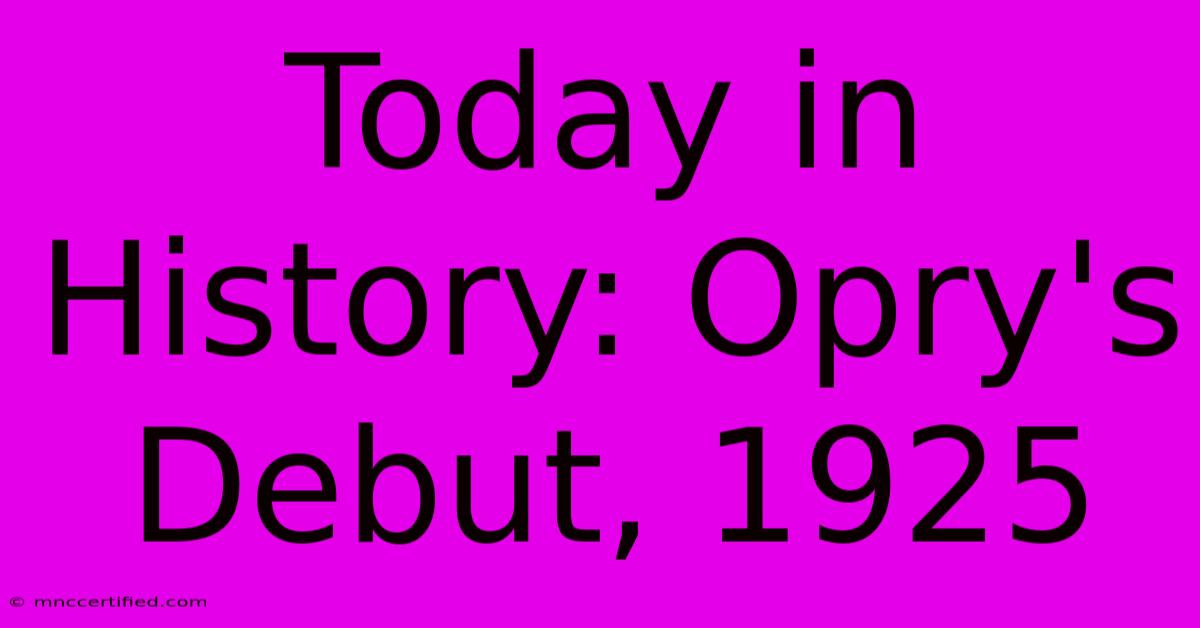Today In History: Opry's Debut, 1925

Table of Contents
Today in History: The Grand Ole Opry's Debut, 1925
On November 28th, 1925, a significant moment in American music history unfolded: the debut of the Grand Ole Opry. This event wasn't just the launch of a radio show; it was the birth of a legendary institution that would shape country music for generations. This article delves into the Opry's humble beginnings, its lasting impact, and why its debut remains a pivotal date in entertainment history.
From WSM's Barn Dance to a National Icon
The Grand Ole Opry didn't spring fully formed into existence. Its roots lie in a radio program called the WSM Barn Dance, broadcast from the National Life and Accident Insurance Company's studio in Nashville, Tennessee. Initially, the show featured a variety of musical styles, including bluegrass, gospel, and early forms of country music. The name "Barn Dance" was a playful nod to the rural, folksy nature of much of the music.
However, it was the move to the Ryman Auditorium in 1927 that truly solidified the show's identity and propelled it to national prominence. The Ryman, nicknamed the "Mother Church of Country Music," provided a larger venue and a more professional atmosphere, further enhancing the show's appeal.
The Pioneers of the Grand Ole Opry
The early years of the Grand Ole Opry showcased a remarkable roster of talented musicians, many of whom became legends. Roy Acuff, known for his energetic performances and signature song, "The Wabash Cannonball," became a cornerstone of the show. Other early stars included Hank Snow, Minnie Pearl, and the Carter Family, whose influence on country music is immeasurable. These artists helped establish the foundation of the genre, showcasing its diversity and emotional depth.
The Enduring Legacy of the Grand Ole Opry
The Grand Ole Opry's debut in 1925 marked not only the start of a long-running radio program but also the beginning of a cultural phenomenon. Its influence extends far beyond simply showcasing music.
-
Preservation of American Folk Music: The Opry played a crucial role in preserving and popularizing traditional American folk music, preventing it from being lost to the passage of time. It provided a platform for artists who otherwise might have remained unknown.
-
The Rise of Country Music: The Opry was instrumental in shaping the sound and identity of country music itself. By providing a consistent platform for country artists, it helped the genre gain national recognition and acceptance.
-
A Cultural Touchstone: The Grand Ole Opry has become a symbol of American culture, synonymous with Southern hospitality, storytelling, and authentic musical expression. Its enduring popularity speaks to its ability to connect with audiences across generations and backgrounds.
-
Continuing Evolution: The Opry continues to evolve, embracing new artists and styles while staying true to its core values. It's a testament to its adaptability and its capacity to remain relevant in a constantly changing musical landscape.
Why the 1925 Debut Remains Significant
The Grand Ole Opry's debut on November 28th, 1925, is a date that holds immense significance in American music history. It represents the genesis of a powerful force in the entertainment world, a show that has entertained millions, launched countless careers, and played a defining role in the development of a beloved musical genre. Its legacy continues to resonate today, making it a milestone worthy of remembrance and celebration.
Further Research and Exploration
For those interested in learning more about the Grand Ole Opry's rich history, numerous resources are available. The official Grand Ole Opry website offers extensive information, including historical archives, artist biographies, and upcoming show details. Books and documentaries detailing the Opry's journey are also readily accessible. Exploring these resources will offer a deeper understanding of this iconic institution and its profound impact on American culture.

Thank you for visiting our website wich cover about Today In History: Opry's Debut, 1925. We hope the information provided has been useful to you. Feel free to contact us if you have any questions or need further assistance. See you next time and dont miss to bookmark.
Featured Posts
-
Ion Bonded Bolt Carrier Group
Nov 28, 2024
-
3 8 Start Investing Answer Key
Nov 28, 2024
-
Guimaraes And Borges Historic Press Conference
Nov 28, 2024
-
Lebanon Ceasefire Israel Hezbollah Agreement Points
Nov 28, 2024
-
Golden Gun James Bond Replica
Nov 28, 2024